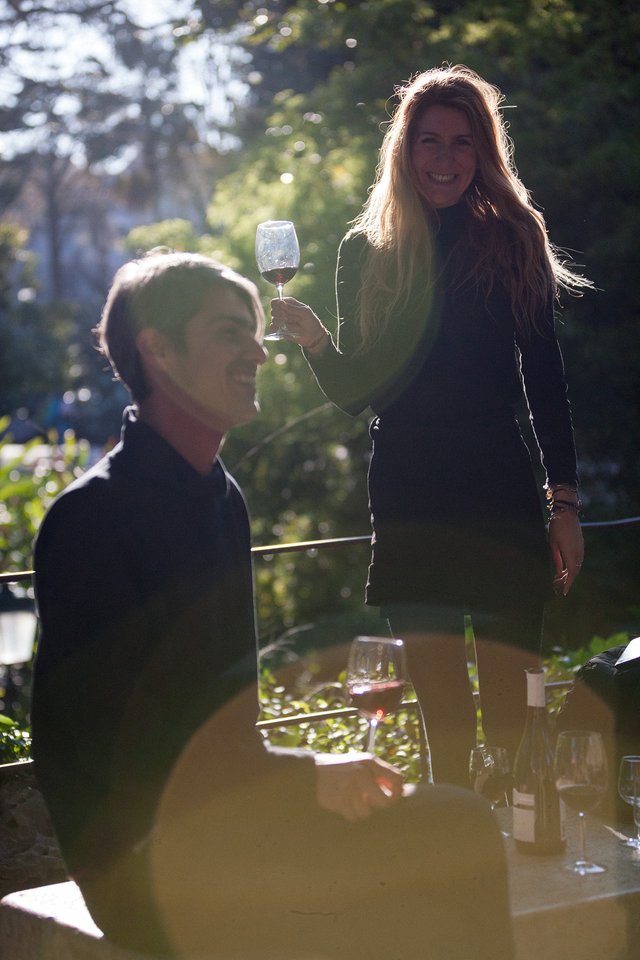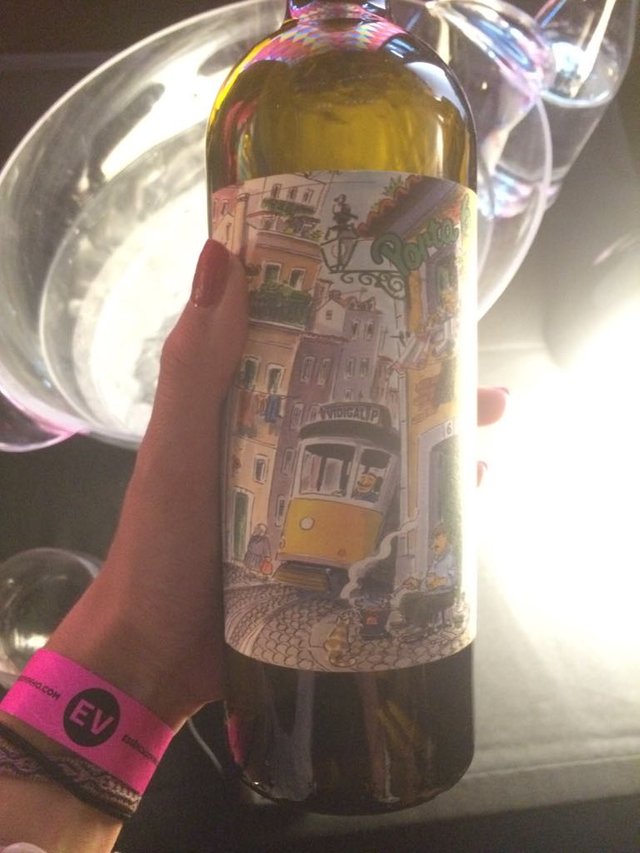How to taste Wine - My private Wine Class -For Lovers and Explorers
As I am a professional in wine business I also speak another language. To teach people about wine is one of my missions. The ability to taste and describe a wine is extremly difficult for newcomers in the world of wine. So I decided to arrgange private wine tastings with five premium wines to teach people how to taste wine properly.
Now I want to share some of the experiences I made with my students in pictures and to explain more and more about the tasting procedure on steemit for the steemit community. It is a pleasure to taste different wines in a row, so that you also have the possiblity of comparison.

Foto made by photographer @algazarra (A very strong and unique personality of arts, with eyes for special moments) you can see the interactive wine class with my student from Brasil, enjoying a Portuguese full bodied red wine.
My first lesson for today for Steemers is the three step system, how to taste and analyse a wine. Especially when you are in a restaurant and you are the one who has to decide if the wine is good to serve or not.
Three steps are needed to taste a wine properly:
LOOK:
Check out the color, opacity, and viscosity (wine legs). A lot of clues about a wine are buried in its appearance, but unless you’re tasting blind, most of the answers that those clues provide will be found on the bottle for example the vintage and the grape variety. Try to describe the color as it is also an indicator for the taste. Lighter wines are mostly fresh than darker ones.SMELL:
When you first start smelling wine, think big to small. Can you detect any special fruit flavours? Think of broad categories first like citrus, orchard, or tropical fruits in whites and for tasting reds, red fruits, blue fruits, or black fruits. Broadly, you can divide the nose of a wine into three primary categories:
Primary Aromas are grape-derivative and include fruits, herbs, and floral notes.
Secondary Aromas come from winemaking practices. The most common aromas are yeast-derivative and are most easy to spot in white wines: cheese rind, nut husk (almond, peanut), or stale beer.
Tertiary Aromas come from aging, usually in bottle, or possibly in oak. These aromas are mostly savory: roasted nuts, baking spices, vanilla, autumn leaves, old tobacco, cured leather, cedar, and even coconut.
Last Step - TASTE:
Taste is how we use our tongues to observe the wine, but also, once you swallow the wine, the aromas may change because you’re receiving them retro-nasally, which means our taste is hollistic - it works only when nose and mouth work together.
Our tongues can detect salty, sour, sweet, or bitter and in addition to that umami. All wines are going to have some sour, because grapes all inherently have some acid. Some varieties are known for their bitterness and it manifests as a sort of light, pleasant tonic-water-type flavor. Some white table wines have a small portion of their grape sugars retained, and this adds natural sweetness. You can’t ever smell sweetness though, since only your tongue can detect it.
Very important is the texture - Your tongue can “touch” the wine and perceive its texture. Texture in wine is related to a few factors, but an increase in texture is almost always happens in a higher-alcohol, riper wine. Ethanol gives a wine texture because we perceive it as “richer” than water. We also can detect tannin with our tongue, which are that sand-paper or tongue-depressor drying sensation in red wines.
So dear Steemers. I hope you learned some intersting insider tipps today and you start to train your wine knowledge.
The more wines you taste, the more comparison you have. So cheers to You!
Merci and enjoy your day,
W.Vanity

A last picture of me holding a special, typical Portuguese bottle. A simple white wine from Porugal, with a label drawn by a German artist. With low acidity and citric fruits.
Sources: I recommend the page wine folly to read more into detail and to know all about wine. I use it as a reference but it is still very specific and for wine experts. :) (www.winefolly.com)
Source
#introduceyourself/#introducemyself
The “introduceyourself/introducemyself” tag is for creating one introductory post that tells us about you. Users are encouraged to use this tag exclusively for that, and not to reuse it.
More information:
The Game of Tags
@spaminator thank you for the information, I didn't know that the categories are that important. I will change for my future posts. Obrigada!
Welcome to Steem @winevanity.
Do read A thumb rule for steemit minnows - 50:100:200:25 for starter tips.
Spend time reading Steem Blue Paper to know how Steem blockchain works and if you still have any queries ask them on our Ask me anything about Steemit post and we will try to answer that.
All the Best!!!
Merci & Obrigada! :)
Welcome to Steem, @winevanity!
I am a bot coded by the SteemPlus team to help you make the best of your experience on the Steem Blockchain!
SteemPlus is a Chrome, Opera and Firefox extension that adds tons of features on Steemit.
It helps you see the real value of your account, who mentionned you, the value of the votes received, a filtered and sorted feed and much more! All of this in a fast and secure way.
To see why 3223 Steemians use SteemPlus, install our extension, read the documentation or the latest release : SteemPlus Points calculation.
Interesting! :)
what kind of wine do you prefer? :)
Why are sulfites added to wines?
Congratulations @winevanity! You have completed the following achievement on the Steem blockchain and have been rewarded with new badge(s) :
Click on the badge to view your Board of Honor.
If you no longer want to receive notifications, reply to this comment with the word
STOPDo not miss the last post from @steemitboard:
Congratulations @winevanity! You received a personal award!
You can view your badges on your Steem Board and compare to others on the Steem Ranking
Do not miss the last post from @steemitboard:
Vote for @Steemitboard as a witness to get one more award and increased upvotes!
Welcome to Steem Community @winevanity! As a gentle reminder, please keep your master password safe. The best practise is to use your private posting key to login to Steemit when posting; and the private active key for wallet related transactions.
In the New Steemians project, we help new members of steem by education and resteeeming their articles. Get your articles resteemed too for maximum exposure. You can learn more about it here: https://steemit.com/introduceyourself/@gaman/new-steemians-project-launch